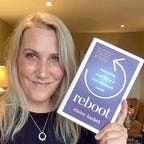Gone But Not Logged Off
Deceased people’s data is burgeoning online. Why should we care?
The ancient Natufians had a practice that, on one hand, seems quite odd to us moderns. They buried their dead under their houses but retained the heads, making plaster death masks to hang on the walls.
On the other hand, are we so different? We too keep our dead around, but they stare at us from our phone and computer screens, physically dead but socially alive. Facebook and Instagram already retain and memorialise the profiles of the dead. Twitter’s launching a new process to memorialise accounts and to make it clearer which profiles belong to the living, and which to people who no longer actually walk the earth.
For most of us, we’re far likelier on any given day to visit a dead person’s ‘digital remains’ than we are to visit a physical place of burial. Social media are shaping how we grieve and carving out places for the dead in our modern, digital society. We’ve essentially handed stewardship for our lost loved ones to the forces of social media, to the market.
What consequences does that have? Why should we care?
I couldn’t think of a better person to talk to about this than Carl Ohman, an alumnus of the Oxford Internet Institute and the 2020 recipient of the Scotus Early Career Researcher award for Arts and Humanities. Carl’s…
